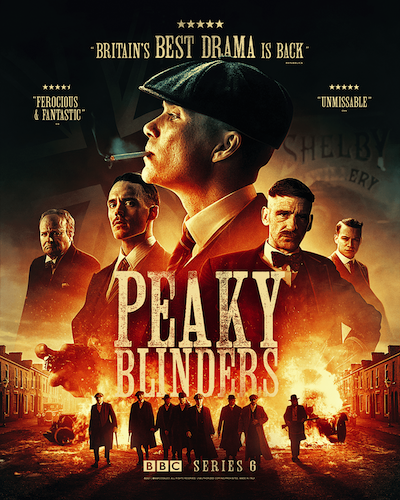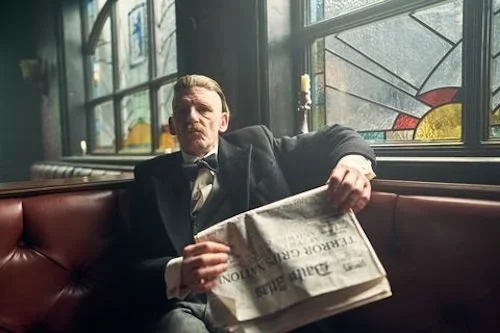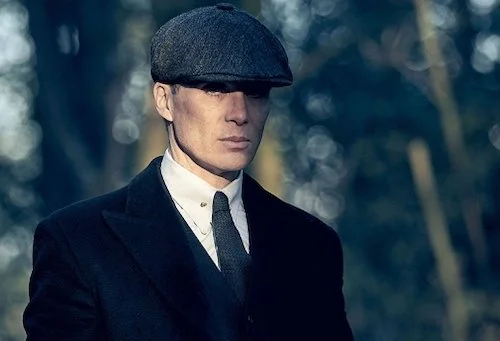Peaky Blinders Series 6: Binge, Fringe, or Singe?
Written by Andreas Babiolakis
Binge, Fringe, or Singe? is our television series that will cover the latest seasons, miniseries, and more. Binge is our recommendation to marathon the reviewed season. Fringe means it won’t be everyone’s favourite show, but is worth a try (maybe there are issues with it). Singe means to avoid the reviewed series at all costs.
Warning: Peaky Blinders Series 6 spoilers ahead. Reader discretion is advised.
Peaky Blinders is finally done, and it wasn’t the smoothest road to get to the finale, but what a ride this BBC crime epic was. For a minute there, series 5 seemed to lose a teensy bit of its footing as the weakest — albeit still good — season, but this swan song series placed us back on track for a strong finish. Part of this has to do with how Thomas Shelby and the Peaky Blinders were prepared to go out guns blazing (figuratively and literally); they say “no one fucks with the Peaky Blinders”, and yet that hasn’t really been the case, since the Peaky Blinders have truly been fucked with by this point. For better or for worse, the mid section of this show felt like creator Steven Knight and company had an ending in sight and were gunning for it. Now that we’re here, Peaky Blinders has been retained as one of the finest examples of British television in recent memory.
We didn’t hear Nick Cave and the Bad Seeds’ “Red Right Hand” as often as we once did, because this sixth series no longer cares about the swagger of the show (we do get some original songwriting from Thom Yorke that I will never shut down). Instead, this was the moment for ghosts to arise from the bodies of the fallen, for those in hiding to whisper their last dregs of their legacies, and for gunshots to ring out and mute the final cries of the innocent (or the fooled). The final stretch of Peaky Blinders feels more ethereal, and part of this likely has to do with the sad passing of Helen McCrory (who played Polly Gray): the spark of the show that often stole any scene she was in. Polly has been murdered in the assassination that was meant to take out politician Oswald Mosley. Her presence is felt, and series director Anthony Byrne makes sure that we’re aware of this (with flickering lights, long passages, and monologues that “talk” with her). No one is brought in to replace the energy of Gray, and it’s as respectful of McCrory and what she brought to the table as it is a wise choice to make Peaky Blinders conclude with regrets and fears (as opposed to the boastful confidence we may have felt before).
Peaky Blinders resolves with a vicious roar.
The rest of the season is devoted to tying up loose ends, either to finish Thomas Shelby’s business for good (at his behest), or to finish off the Peaky Blinders. Which side of this evil coin will win? Well, Peaky Blinders figured out early on that no one ever truly wins if they live a life of crime. It’s when you bow out that you can dictate if you have won or lost (likely won, given that you’ll still be alive to tell the tale). The Peaky Blinders are due to conclude their business with associates and enemies, all while Thomas Shelby is preparing to die (either via an assailant or his tuberculoma getting a final say in the matter). Much of the season is tense, either with people trying to bite off more than they can chew (Gina Gray comes to mind as a noteworthy example, as she tries to drive key players to their death), or with Thomas’ own personal demons finally causing this cauldron to boil over. Nearly everything about series 6 seems to serve a purpose, and it’s something that made me feel very invested during these last episodes.
This all leads up to “Lock and Key”, which is actually my favourite episode of the entire series. It doesn’t wrap up Peaky Blinders as much as it allows it to fade into the night in a haunting fashion. It begins with some early-episode exposition to get us lined up for three breathtaking sequences. The first is Arthur Shelby Jr. and company having to defend themselves from an attack by the Irish Republican Army, with a slow burning standoff in the middle of an alleyway (with extreme quiet shattered by blaring gunshots that echo for an eternity) that lasts what felt like twenty minutes), and I loved every single second of this. If anything, it felt like a highlight of the year in television thus far, particularly because of how unpredictable — and ultimately fulfilling and meaningful — this sequence was. Next comes the breath of fresh air after the bloodbath of catharsis: Thomas Shelby’s decision to die alone after a farewell to his loved ones (who are seemingly now protected from harm), and it’s an emotional moment shot with luscious greens around familiar faces (to combat the typically gloomy, mossy photography we’re used to for an entire series). This is how Thomas says goodbye: knowing that the lives of others are going to be much better than his ever was. Thomas exiles himself from anyone and anything for a month, and we get to the final sequence of them all: complete ambiguity.
Thomas Shelby’s self exile allows Peaky Blinders to experience an unexpected, poetic resolution.
Thomas is preparing to kill himself once more, bringing us back to the ending of series 5 (except now there is much more closure, and this isn’t an escape as much as it is a bow). It’s during one of his hallucinations that he realizes that he was apparently fooled by his doctor, who was in cahoots with Oswald Mosely. Thomas plants his wagon nearby and sets out to kill once more; his wagon is spotted and declared a gypsy settlement, and is subsequently set on fire. Thomas isn’t in the wagon, though: he was hiding in the doctor’s car, and he finds his target and makes his claim. The clock strikes eleven o’clock, and Thomas realizes that he’s not about this life anymore; this time has passed. He left his family, the Peaky Blinders, and his previous life behind to emancipate them from his crimes and evils, and vice versa. He wasn’t going to die from tuberculoma, and he needn’t die by anyone’s hand anymore either (let alone his own). He shoots the ground as a warning and leaves, only to spot his remaining possessions now destroyed. He rides his white horse like a ghost into the field, and Peaky Blinders concludes. Thomas is neither dead or alive: he simply just is.
Not allowing Peaky Blinders to go for the easy solutions (have Tommy die, or have the happy ending where everything is okay) was the right call, because a copout could have soured everything we’ve just seen (what was it all for?). Instead, this finale grants us a jaw dropping climax, a heartbreaking wave, and a lasting question: what is to come of Thomas Shelby? What would his new life look like? I’m not sure, but I can guarantee it won’t be the Peaky Blinders (or anything like it). I’m glad we don’t find out, because not everything demands to be defined or labeled. We only got to know this side of this man, and that is his curse (and our burden to bear). What comes next doesn’t concern us. It’s only for Tommy to experience. It’s the kind of guts that some of the best finales exude: a lingering uncertainty that keeps us talking. The Leftovers, Mad Men, The Americans, and The Shield finished off with this grey area. I’m not saying the Peaky Blinders is of the same caliber, but it definitely was influenced by some of these perfect finales. There’s just enough answered that we get to feel like Peaky Blinders is finally over, but there’s that inexplicable cherry on top that will leave us wondering. Opting for this mystery is the last rock and roll choice Peaky Blinders — the most rock and roll show in recent memory — could have mustered, because it found one last way to defy its expectations.
Andreas Babiolakis has a Masters degree in Film and Photography Preservation and Collections Management from X University (formerly known as Ryerson), as well as a Bachelors degree in Cinema Studies from York University. His favourite times of year are the Criterion Collection flash sales and the annual Toronto International Film Festival.






